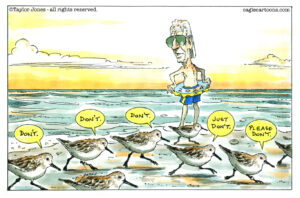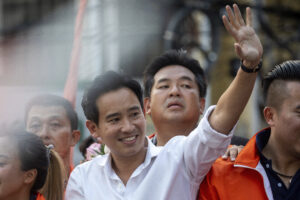A French Leftist Ritual Takes On Sarkozy
This week has seen the annual ritual by which the left in France marks summer's end and the resumption of politics as usual. This ritual is a general strike called by the left, whenever a rightist government is in power.PARIS — This week has seen the annual ritual by which the left in France marks summer’s end and the resumption of politics as usual. This ritual is a general strike called by the left, whenever a rightist government is in power.
Competitive claims are made concerning how many marched Tuesday in denunciation of President Nicolas Sarkozy and his government. Buses mostly ran; the Metro mostly did not. Letters were undelivered. The weather was mild, and a boring and noisy time was had by nearly all, especially those who took the day off and didn’t waste it marching. The French predilection for marches and demonstrations bemuses foreigners, and frequently annoys them because of the inconveniences caused. It is playtime revolution, but nonetheless very serious.
This year, the main issue was the character, personality, activity, policies and ultimate failure of Sarkozy — denounced with enthusiasm by most of the demonstrators.
Sarkozy is a strange fellow, for a politician. He doesn’t search for popularity or love. He has constantly skirted the risk of making people hate him for his arrogance, brashness and material ambition (one of his first acts as president was to more than double the presidential salary — if only up to general European standards of income, but it was the gesture that counted).
The night of his election, he flaunted his connections with some of France’s richest industrialists, and immediately left for a holiday on a rich man’s yacht. This no doubt was celebration and self-validation by the Hungarian immigrant’s son, who speaks demotic and often vulgar French, wears lifts in his heels to look taller than he is, and whose behavior proclaims aggressive insecurity as much as political ruthlessness.
He nonetheless seized France’s popular imagination to make himself president, and became the most active, and in certain respects the most successful, French president in the last 30 years. He unblocked many of what for years were sterile or stalemated relations with the unions — fading in members and power, still suffering the ideological hangover of their period of real power, which lasted from the Popular Front (1936-1938) until the 1970s, when revolution in Europe had become a myth, and the socialist parties stole the communists’ intellectuals, and then their voters. Sarkozy invited the union leaders to the presidential palace for consultations.
He has made a serious effort to reform the neglected university system, and to correct foolish tax excesses.
His current unpopularity, three years on, is self-created, the product of a vanity that inspired him recklessly to ignore the constitutional structure of de Gaulle’s Fifth Republic, and his intellectual volatility — the changeableness of his ideas — which has made his leadership seductive but inconsistent. People have ceased to believe in him.
The constitution places a French president in a position of reserved overall policy direction and arbitration, and defense of the principles and institutions of the nation. It provides him a prime minister to conduct the day-to-day business of government, a parliament to debate and vote upon policy.
Sarkozy wanted to do it all, because that placed him fully in the limelight, where he daily invented national policy and inconsistently commented on national affairs as things caught his eye. He consistently humiliated his prime minister, even though he depended on him. His taste for wealth and display alienated him from the public, who expected from the state the formal symbols of power and authority, and had always been tolerant of the greed of ordinary politicians, but would not accept Sarkozy’s apparent change of political sides from that of defender of the citizen, whose votes had given him his mandate, to collaborator of the rich, powerful and insolently privileged. This is what has done him in.
As a distinguished centrist political figure, Jean-Louis Bourlanges, recently wrote, de Gaulle made the chief of state in France “the defender of what must count, and of what must last” in the nation. Nicolas Sarkozy made the presidency representative “of what glitters and passes on: His inconstancy mixed the durable and the ephemeral, the fundamental and the incidental.” This has undermined the institutional references of the citizenry, and now has left them angry at what he has done.
The second subject of anger in these demonstrations was anodyne rather than apocalyptic in implication — although there was a trace of the latter. It was a proposed legislative rise in the national retirement age, which is all but certain to be adopted. It is the same issue that generates controversy in most of the advanced democracies, given the world economic crisis and lengthening life spans, immigration and accompanying demographic trends — even in the United States, which pronounces itself no welfare state, but still pays people retirement benefits (thanks to having successfully resisted the Republican and Wall Street campaigns of recent years to “privatize” Social Security, meaning to put all that money into play on the stock market).
In France, as mostly elsewhere, the retirement age doesn’t mean automatic retirement, but is the age when people cease to pay into the national pension system, and the pension system begins to pay out to them. Putting the age up prolongs high deductions from an individual’s wages and higher contributions from employers. The main demand by the demonstrators was that bosses pay the extra money, not the workers. Surprise, surprise — but the bosses during the past decade have successfully convinced us all that they not only deserve to pay more, but had better do so or risk popular upheaval.
Visit William Pfaff’s website for more on his latest book, “The Irony of Manifest Destiny: The Tragedy of America’s Foreign Policy” (Walker & Co., $25), at www.williampfaff.com.
© 2010 Tribune Media Services, Inc.
Your support matters…Independent journalism is under threat and overshadowed by heavily funded mainstream media.
You can help level the playing field. Become a member.
Your tax-deductible contribution keeps us digging beneath the headlines to give you thought-provoking, investigative reporting and analysis that unearths what's really happening- without compromise.
Give today to support our courageous, independent journalists.






You need to be a supporter to comment.
There are currently no responses to this article.
Be the first to respond.